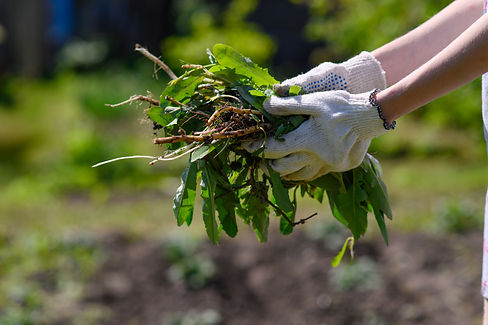
OUR FARM PRACTICES
Dahlias & Dogwood's tubers and blooms are grown here on our family farm using organic, earth-minded practices so you can shop with confidence that you’re getting the healthiest possible product.

Soil Care
Soil is the lifeblood of plants and as its health determines the health of what we grow and sell, our growing practices are soil-focused.
We start each season with a soil sample which informs what nutrients, if any, we add to the soil to restore its balance for optimal plant health.
After an initial tilling to prepare a fallow bed, the soil is thereafter left intact so as not to ruin the soil structure or harm the beneficial soil microbes.
We feed soil microbes (so they "feed" our plants) throughout the season with a layer of straw mulch that slowly decomposes to release nutrients as well as our comfrey tea applications described under "Fertilizing...or Not" below.
In the off-season, each dahlia bed is nourished with a mixed cover crop that enhances soil health by increasing organic matter, protecting it from erosion, and replenishing nutrients for next season’s dahlias.
Biodiversity
Along with soil care, increasing the variety of life (also known as "biodiversity") on our farm is always top of mind. A larger variety of plants brings in a larger variety of insects which brings in a larger variety of birds...you get the idea and that's just what's happening on TOP of the soil.
I experienced firsthand on our farm in Georgia how the more plant species we introduced, the less issues we had with insect populations getting out of balance.
To increase biodiversity in our dahlia patch, we include “bio beds” (short for “biodiversity beds”) in which we grow a variety of plants that are known to bring in beneficial insects and feed local pollinators—two things dahlias raised for cut flowers aren’t great at!
These beds are seeded and/or planted with native wildflowers, yarrow, echinacea, black-eyed Susan, calendula and comfrey.


Fertilizing...Or Not
Rather than traditional fertilization to keep our dahlias thriving, we focus on feeding our soil microbes with a foliar spray of our farm-brewed comfrey tea every 10 -14 days.
We also include humic acid, fulvic acid, kelp meal, fish emulsion, and unsulfured blackstrap molasses in our super stinky brew.
This foliar spray improves our dahlias' ability to take in nutrients and resist pests / disease. (More on this under "Pests & Disease" below).
Here's the "recipe" we use on our farm per gallon of water (or comfrey tea) in a backpack sprayer:
2 Tbsp. unsulphured blackstrap molasses
1/8 cup liquid fulvic and humic acid combo
1/4 cup liquid kelp meal
2 Tbsp. fish emulsion (stop using once see buds forming)
(Word to the wise...make sure the lid to your sprayer is on TIGHT otherwise your back will be marinated in this delicious fragrance.)
Warren Vigor is a champion dahlia grower in Michigan and contributes his success to his Vigor Plant Booster which has the above ingredients in one concentrated formula if you can get your hands on it (it's often out of stock).
Pests & Disease
Organic gardening is much less frustrating when you stay on the offense! We take a preventative approach when it comes to pests and disease with our soil care practices, our focus on biodiversity to increase beneficial insect populations, and our bi-weekly comfrey tea applications.
These practices help produce healthier plants that have higher Brix values (Brix is a measure of sugar content in the sap which indicates how well your plant is photosynthesizing). The higher the Brix value, the better your plant is photosynthesizing and therefore the healthier, and more pest and disease-resistant the crop.
You can read more about Brix values and how they affect plants and pests here.
If we ever have insect populations that become out of balance and problematic, we get extra help from Arbico Organics' selection of beneficial insects or beneficial nematodes. Additionally, we may spray our plants with neem oil in the early morning or late at night when most beneficial insects aren't active.
And finally, we cull and dispose of plants that show signs of disease or that fail to thrive (ugh...even if it's a plant that grew from a $30 tuber) and use strict harvesting sanitation practices when harvesting blooms and dividing tubers.


Weeding
To naturally combat weeds and add organic matter to our soil, we rely heavily on straw mulch to cover the soil. For weeds that push through, we hand weed only. Our dahlias are never sprayed with toxic herbicides.